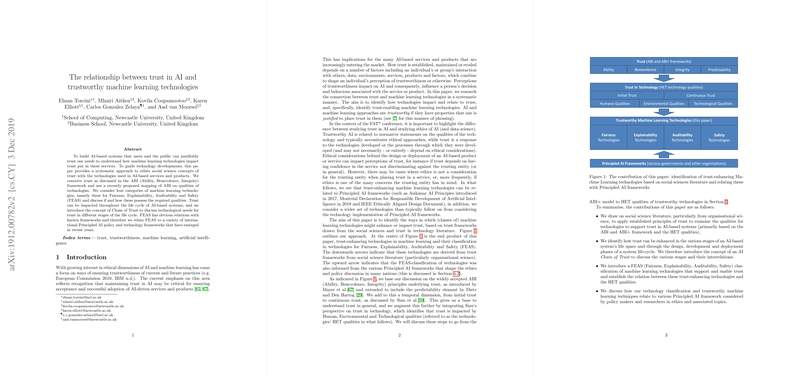Trust in AI: Bridging Social Science and Machine Learning Technologies
The paper "The relationship between trust in AI and trustworthy machine learning technologies" thoroughly examines how trust is conceptualized within social science and the implications this has on the development and deployment of ML technologies. It explores the intersection of social science principles of trust with technical considerations in AI, proposing an integrated perspective to identify trust-enhancing technologies.
Overview of Trust Frameworks
The paper is grounded in the ABI framework (Ability, Benevolence, Integrity) familiar within organizational sciences, wherein trust is a continual, non-binary process. It extends this model by incorporating predictability, thereby adopting the ABI+ framework. It further recognizes that trust interacts with human, environmental, and technological qualities, underpinning a multi-dimensional view of trust in technology.
Chain of Trust Concept
The authors introduce the "Chain of Trust" concept, underscoring that trust is influenced throughout the ML lifecycle—from data collection and feature extraction to model training, testing, and inference. They argue that enhancements at any stage can affect overall trustworthiness and, potentially, public perception and adoption. For instance, improvements in data preparation can mitigate bias and hence bolster trust when the technology delivers more equitable results.
Classification of Trustworthy Technologies (FEAS)
The paper proposes an incisive classification of technologies that bolster trust within AI systems, encapsulated in the FEAS—Fairness, Explainability, Auditability, and Safety. These dimensions are positioned as pivotal in aligning AI systems with the sociotechnical expectations and norms outlined in various Principled AI frameworks:
- Fairness Technologies: These aim to ensure non-discrimination and equity in ML algorithms through meticulous data handling and model design, despite the complexities posed by multiple fairness definitions.
- Explainability Technologies: They enhance user understanding by clarifying model decisions, crucial for trust but technically challenging particularly in opaque models like deep neural networks.
- Auditability Technologies: Allow third-party verification and monitoring of AI operations, offering transparency and accountability.
- Safety Technologies: Focused on securing data and algorithms against breaches and manipulation, thereby maintaining integrity and confidentiality.
Aligning with Principled AI Frameworks
The paper navigates the landscape of international Principled AI frameworks, identifying commonality across them in addressing fairness, transparency, and accountability. By aligning FEAS technologies with these frameworks, the paper provides a structure for translating policy objectives into actionable technological implementations.
Conclusion and Implications
This investigation emphasizes that trust in AI is not solely an ethical or procedural concern but a technical one integrally woven through every stage of a system's life cycle. The intersection of social science and technology perspective is crucial for fostering AI systems that are not just operatively functional but also socially accepted and trusted.
The paper’s insights have significant ramifications for future AI research and development, suggesting pathways for designing technologies that inherently support trust. For practitioners and researchers in AI, this work spells out a roadmap for integrating trust-centric methodologies into their projects, potentially resulting in broader acceptance and reliance on AI technologies in various societal sectors. As AI continues to evolve, addressing these multi-dimensional trust considerations will be vital in ensuring that AI systems are not only efficient but also aligned with human values and expectations.
